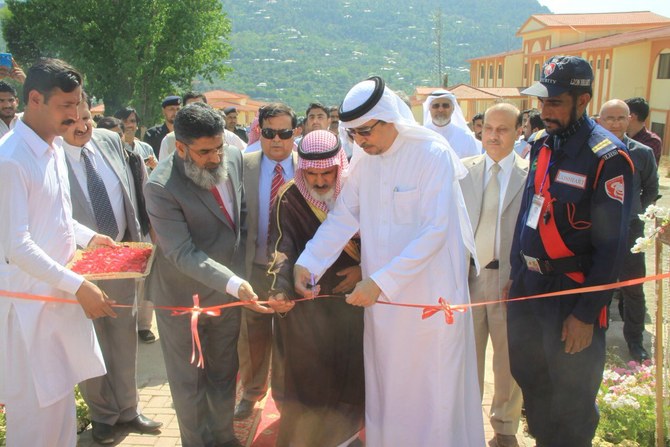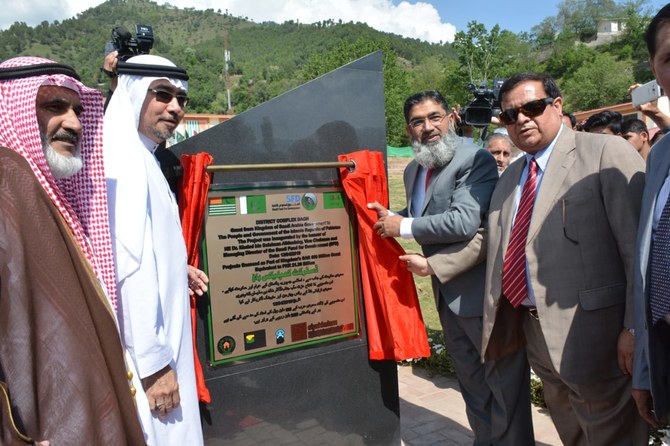ISLAMABAD: Pakistan’s Earthquake Reconstruction and Rehabilitation Authority (ERRA) and the Saudi Fund for Development (SFD) completed a complex to house government offices in Rawalakot city in Pakistan-administered Kashmir, a spokesperson for ERRA said on Tuesday.
Rawalakot was among the areas hit by a devastating 7.6 magnitude earthquake on Oct. 8, 2005, which wrought widespread death and destruction in Kashmir and parts of Pakistan’s northwestern Khyber Pakhtunkhwa (KP) province.
The death toll from the 2005 quake was more than 75,000 while tens and thousands of buildings, including schools, hospitals, and other state infrastructure, were damaged.
The Saudi-funded complex, inaugurated on Monday, has 25 blocks and will house district government offices, the ERRA official said.
“Government and people of Pakistan highly value the timely contribution of our brotherly country to alleviate miseries of earthquake affected Pakistani people,” the Acting Deputy Chairman of ERRA, Brig Muhammad Latif, said in a statement.
A high-level delegation from SFD, ERRA, officials from the Economic Affair Division, and the Azad Kashmir government were present at the inauguration ceremony of the complex.
“It was the professional commitment and dedication of Adviser Engineer Abdullah M. Al-Shoaibi, Yasir Al Bakri Project Manager Engineer SFD, and Faisal Al Yahya, engineer operation department SFD, that led to the successful completion of the projects,” Latif said.
Saudi Arabia has been an active partner of ERRA in the reconstruction and rehabilitation of earthquake affected areas after October 2005.
“SFD provided a grant of US $160 Million for the construction of educational and health facilities in Kashmir and KP, while at present out of 6 mega projects, 5 mega projects have been successfully completed in governance and education sectors in Kashmir,” ERRA said in a statement.
Saudi Arabia is also funding the King Abdullah University in Muzaffarabad, the capital of Pakistan-administered Kashmir, which is currently under construction and slated to be completed by June 2019, according to Latif.
ERRA’s acting deputy chairman thanked the guests, including the Deputy Head of Mission Habeeb Ullah Al Bokhari, for their support.
According to a UN Financial Tracking Service report released in October last year, Saudi Arabia is ranked fourth among the world’s major donors of humanitarian aid.
In Pakistan itself, the Kingdom has provided assistance amounting to $107.3 million, used in the implementation of 85 projects for displaced people affected by floods and earthquakes between 2005 and 2018, the report said.
In April 2018, Saudi Ambassador to Pakistan Nawaf Saeed Al-Maliki inaugurated the King Abdullah Teaching Hospital in Mansehra, another earthquake-hit district of KP province.
Saudi-funded office block inaugurated in quake-hit Rawalakot city
Saudi-funded office block inaugurated in quake-hit Rawalakot city

- Complex opened in Rawalakot on Monday, has 25 blocks for district government offices
- Saudi Arabia major partner in reconstruction efforts since devastating October 2005 quake in Pakistan
Pakistan warns of heightened glacial lake flood risk as temperatures rise

- NDMA says early heatwave conditions could accelerate glacier melt in northern Pakistan
- Authorities urge contingency planning, early warnings and evacuations in at-risk areas
PESHAWAR: Pakistan’s disaster management authority warned on Thursday of an elevated risk of glacial lake outburst floods (GLOFs) starting next month as rising temperatures threaten to accelerate snow and glacier melt in the country’s northern regions.
The National Disaster Management Authority (NDMA) said seasonal forecasts point to higher-than-normal temperatures and possible early heatwave conditions that could destabilize glacial lakes in Gilgit-Baltistan and upper Khyber Pakhtunkhwa.
GLOFs occur when water from melting glaciers breaches natural barriers and is suddenly released, triggering fast-moving floods downstream.
“Increasing temperatures during March to June 2026 may accelerate snow and glacier melt in Gilgit Baltistan and Upper Khyber Pakhtunkhwa, heightening the risk of GLOF incidents,” the NDMA said in a statement. “Such events can trigger flash floods, causing damage to homes, infrastructure, agriculture, communication networks and may result in human casualties in vulnerable downstream communities.”
The advisory identified several potentially exposed areas, including valleys in Gilgit-Baltistan such as Ishkoman, Gulkin and Gulmit, as well as parts of Chitral and Upper Dir in Khyber Pakhtunkhwa.
The NDMA urged provincial and local authorities to review contingency plans, strengthen early warning systems and prepare evacuation arrangements where necessary.
Communities living near glacial streams were advised to remain vigilant, avoid unnecessary movement in high-risk zones and follow official instructions.
Climate change has become a major concern for Pakistan, which is frequently ranked among the world’s most vulnerable countries to global warming despite contributing less than 1 percent of global greenhouse gas emissions.
In recent years, the country has endured devastating floods, prolonged droughts and record-breaking heatwaves that have killed thousands of people, damaged critical infrastructure and deepened food security challenges.












